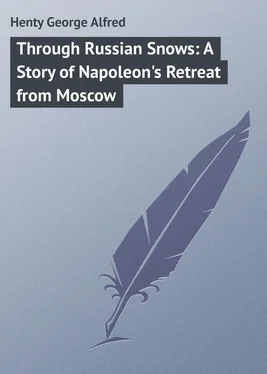George Henty - Through Russian Snows - A Story of Napoleon's Retreat from Moscow
Здесь есть возможность читать онлайн «George Henty - Through Russian Snows - A Story of Napoleon's Retreat from Moscow» — ознакомительный отрывок электронной книги совершенно бесплатно, а после прочтения отрывка купить полную версию. В некоторых случаях можно слушать аудио, скачать через торрент в формате fb2 и присутствует краткое содержание. Издательство: Иностранный паблик, Жанр: foreign_prose, foreign_children, на английском языке. Описание произведения, (предисловие) а так же отзывы посетителей доступны на портале библиотеки ЛибКат.
- Название:Through Russian Snows: A Story of Napoleon's Retreat from Moscow
- Автор:
- Издательство:Иностранный паблик
- Жанр:
- Год:неизвестен
- ISBN:нет данных
- Рейтинг книги:5 / 5. Голосов: 1
-
Избранное:Добавить в избранное
- Отзывы:
-
Ваша оценка:
- 100
- 1
- 2
- 3
- 4
- 5
Through Russian Snows: A Story of Napoleon's Retreat from Moscow: краткое содержание, описание и аннотация
Предлагаем к чтению аннотацию, описание, краткое содержание или предисловие (зависит от того, что написал сам автор книги «Through Russian Snows: A Story of Napoleon's Retreat from Moscow»). Если вы не нашли необходимую информацию о книге — напишите в комментариях, мы постараемся отыскать её.
Through Russian Snows: A Story of Napoleon's Retreat from Moscow — читать онлайн ознакомительный отрывок
Ниже представлен текст книги, разбитый по страницам. Система сохранения места последней прочитанной страницы, позволяет с удобством читать онлайн бесплатно книгу «Through Russian Snows: A Story of Napoleon's Retreat from Moscow», без необходимости каждый раз заново искать на чём Вы остановились. Поставьте закладку, и сможете в любой момент перейти на страницу, на которой закончили чтение.
Интервал:
Закладка:
Thinking it over, an idea suddenly occurred to him. When sailing along the coast with Bill, the latter had one day pointed out to him a hole in the cliff some twenty feet above high-water mark. "Do you see that hole, Mr. Julian?"
"Yes, I see it plain enough. What of it?"
"Well, sir, if I owned all the goods that have been taken into that hole on dark still nights I should be a rich man."
"Do you mean to say that they run cargoes there, Bill?"
"Not kegs – they are too heavy and too awkward to get away – but laces, and silks, and such like. Many a lugger when she comes from abroad lands all them sorts of things here, and then sails away and takes her chance of running the rest of the cargo somewhere else."
"But how can anyone get up there? I see nothing like a path."
"There ain't no path, sir. The revenue men would have found it out long ago if there had been. The boat comes along, as I said, of a dark night, when there is no swell on, and the chaps inside show a tiny light to guide them to the spot. When the boat comes, they lower a rope down and haul the bales up; and then the boat goes back to the lugger, and she ups sail, and no one is the wiser."
"But what do they do with the stuff? I don't mean, where do they stow it, but how do they get it away?"
"There is a passage somewhere," Bill replied. "I don't know where it goes out. I reckon there ain't half a dozen men in Weymouth who do know. I should say, except the men whose business it is to take the goods inland and forward them to London, there is only one chap who is in the secret; and he is not in Weymouth now – he is in jail. That is Joe Markham. He is in for poaching. But for a good many years he sailed in one of those French luggers. Then, as I have heard, he was keeper of the cave for a bit; but he had to give it up – he was too well known to the coast-guard, and they kept too sharp an eye on him for him to venture to go out. He had had enough of the sea, and no doubt he had got some money laid by; anyhow, he took a cottage by the river, and took to poaching, more for devilment, I should say, than because he wanted the money. I expect he was well paid by the smugglers, for he used to get up half the stories to put them off the scent, and never missed being present when a run was made."
This conversation came back to Julian's memory, as he stood by the clump of bushes wondering what had become of the man that he had pursued, and it flashed upon him that the spot where he was standing could not be far from the smugglers' cavern, and that the entrance to this might very well be among these bushes. The man knew where that entrance was, and nothing was more likely than that he should make for it as a place of concealment until an opportunity occurred to get on board a lugger and cross the channel. It was a very likely place; men could come and go at night without risk of being seen or heard by any of the coast-guardsmen on the cliff, and would not be likely to encounter anyone within two or three miles of it. Years might pass without anyone happening to enter the bushes.
Laying down his gun, Julian began to search in earnest. It was half an hour before, feeling about in the coarse grass, he came upon a handle. He pulled at it, gently at first, then as it did not yield, he exerted his strength, and it gave way, and a section of the rough herbage rose, while three feet away it sank in the same proportion. Raising it higher, he saw that the trap-door – for such it was – was two feet wide by about five feet long and eighteen inches deep; it was, in fact, a deep tray pivoted on the centre and filled with earth, on which grass grew as freely as in the ground adjoining.
The greater portion of the trap was overhung by bushes, which grew so thickly around the part which sank that the probability was small indeed that anyone would tread upon it. Julian saw, too, that under the handle was a bolt that, when fastened, would hold the trap firmly down. No doubt the man in his haste had forgotten to fasten it before he descended. Looking down, Julian saw a circular hole like a well, evidently artificially made in the chalk; a ladder was fastened against one side.
Julian hesitated. Should he return to Weymouth, inform the authorities that he had traced the murderer of Mr. Faulkner to a place of concealment, and bring them there to arrest him, or should he go down and encounter him single-handed? Although of a fearless disposition, he would have decided on the more prudent course had it not been that to have done so, would have let the authorities into the knowledge of the smugglers' cave. Although he had determined to have nothing more to do with them, this he felt would be an act of treachery, for it was only because he had been believed by Bill to be absolutely trustworthy, that the latter had told him of the existence of this cavern and of the secret exit, and without that information he would never have searched for and discovered the trap-door. Then, too, the thought that the credit he would gain by the capture of the murderer single-handed would go far to efface the memory of the disgrace that had befallen him, helped to decide him.
He fetched his gun and slung it over his shoulder, got upon the ladder, and pulled the trap-door down behind him. As he did so he found that it moved easily, and that he could push it up again without any difficulty, and feeling the bolt, discovered that it had been partially shot, but not sufficiently to catch fairly, although containing so far a hold of the frame, that it had torn a groove in the somewhat rotten wood with the force that he had used to raise it. He went down the ladder very cautiously, until, after descending for some thirty steps, his foot encountered solid ground. After a moment's consideration he knelt down and proceeded on his hands and knees. Almost immediately he felt the ground slope away in front of him. He got on to his feet again. Holding out his arms he found that the passage was about four feet wide, and he began to descend with extreme care, feeling his way along both walls. He had gone, he thought, about fifty yards when the passage made a sharp turn, still descending, and at a considerable distance ahead the light streamed in through a rugged hole. He walked more confidently now, and soon the light was sufficient to enable him to see the path he was following.
On arriving at the aperture, he saw that, as he expected, he was looking over the sea. On one side of the hole there was a shelf cut in the chalk. This was stained as if by oil, and he guessed at once that it was a look-out and a spot for signalling a craft in the offing. The path here turned again and ran parallel with the face of the cliff. There was no occasion to exercise care in walking now, as here and there the light streamed in through openings a few inches long. He now unslung his gun, stooped and took off his boots, and then proceeded noiselessly. The descent was considerable, and in some places steps had been cut. At last he arrived at a door. It was roughly but very solidly made, and would doubtless sustain an attack for some time before it yielded, and so would give time to the occupants, in case the trap-door was discovered, to make their escape by the lower entrance on to the beach. There was a latch to it. Lifting this quietly, he found the door yielded, and, holding his gun in his right hand ready to cover the fugitive the moment he entered, Julian threw the door wide open and sprang forward.
He had not calculated on a further descent, but the floor of the cave was five feet below him, and he fell heavily upon it, the gun going off as it struck the floor. Instantaneous as the fall had been, his eyes had taken in the scene. Several lanterns faintly lit up the cave; while in the centre a table, at which several figures were sitting, was illuminated by three or four candles. He was partly stunned by the heaviness of his fall, but vaguely heard shouts of surprise and alarm, and was, a minute later, roughly seized and dragged along. Then he felt that he was being tightly bound. For some minutes he was left to himself, but he could see three men with guns in their hands standing near the door by which he had entered, listening attentively. Presently he heard steps coming down the passage and two other men came through the door, shut and bolted it carefully, and then came down the steps into the cabin.
Читать дальшеИнтервал:
Закладка:
Похожие книги на «Through Russian Snows: A Story of Napoleon's Retreat from Moscow»
Представляем Вашему вниманию похожие книги на «Through Russian Snows: A Story of Napoleon's Retreat from Moscow» списком для выбора. Мы отобрали схожую по названию и смыслу литературу в надежде предоставить читателям больше вариантов отыскать новые, интересные, ещё непрочитанные произведения.
Обсуждение, отзывы о книге «Through Russian Snows: A Story of Napoleon's Retreat from Moscow» и просто собственные мнения читателей. Оставьте ваши комментарии, напишите, что Вы думаете о произведении, его смысле или главных героях. Укажите что конкретно понравилось, а что нет, и почему Вы так считаете.












